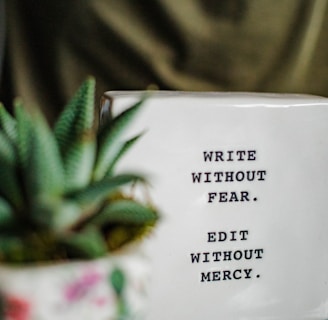Can you Write? A challenge to the aspiring but not yet writing writer
PAGE WORKBACK PAGE


Can you write?
We will write only if we believe that we can write. We need faith and belief in the power of language to express our thoughts and feelings. To believe in our ways of expression is to have faith that whatever we write will resonate.
This is not an ego boost or a byline treat. But this is about a deep respect for the processes of creation. From the depths of their being, writers know that they need exact words to tell a story, that these words won’t simply surface, and that storytelling is not a joke. In writing one is simultaneously constrained and liberated. It involves adhering to grammatical rules and structural constraints while simultaneously allowing for boundless exploration and expansion. Writing is a delicate balance of discipline and freedom.
Do you believe in writing?
We need to cultivate our faith in writing, not a one-time, but continuous discipline. It’s not always easy to attain a complete belief in the worth and value of writing, first for the writer, and then for the reader. This involves having a place that will serve as the home of creation; there is enough space here for comfortable creativity; and the imaginative crafting of words will flourish in this place. This is not merely our physical home with that choice writing desk and chair, but also the innermost chamber of our writer’s heart, a house of many stories.
Honing our writing faith also means embracing our shortcomings. Sometimes these are obvious, but often they lurk beneath our pride. It's a form of pride to dwell on our flaws before even starting. We might dream of perfect writing in one go, of expressing profound meaning with effortless ease. But the reality is, flaws are inevitable. No matter how hard we try, we'll always find something that could be better.
Do you believe that language has power?
Furthermore, we must cultivate a deep belief in the power of language. Each language is a vibrant entity, constantly evolving as meanings shift and expand. Language is not merely a tool for communication; it is a force that shapes our understanding of the world, allowing us to mold stories, break down barriers, discover new truths, and even challenge existing narratives.
If we truly believe in this power, we must be willing to take risks with our language. We should be ready to leap beyond the familiar, to cross the bridge of doubt, and to delve into the unknown.
Are you reading as a writer?
All these can happen only if we strive to know the writings. How often do we read, how deeply do we study other author’s creations? Sometimes, we just want to enjoy, and we don’t often expect lessons from what we read. But if we are honing our faith in writing, it is not enough to be entertained, and our reading is not complete if we will not learn anything. As writers we can’t miss the techniques of creation and division, excellent descriptions of images, ideas and designs in author's excellent works.
We can get exhausted and lose inspiration, motivation, and self-confidence. But while we believe that writing has meaning, all are temporary parts of creation. There is not one, definitive way, to become one who can say with confidence “I CAN WRITE.” It's a journey of constant learning and tweaking, going back and forth, always trying to make things better.
Subscribe to our newsletter

